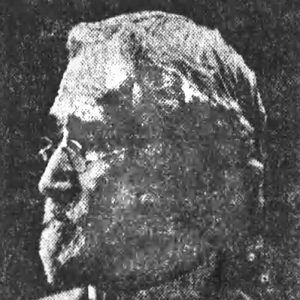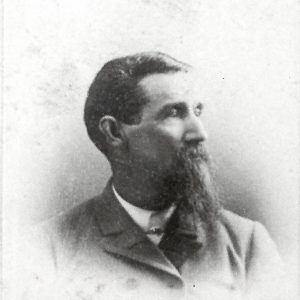calsfoundation@cals.org
Ransom Gulley (1839–1921)
Ransom Gulley was an educator, lawyer, entrepreneur, and politician who lived much of his life in Independence and Izard counties.
Ransom Gulley was born on a farm near Raleigh, North Carolina, on January 24, 1839, one of at least seven children of John G. Gulley and Mary Gulley. Gulley was educated at home by a private tutor. In 1860, he studied law in Tennessee. In January 1862, Gulley enlisted in the Confederate army at Pocahontas (Randolph County), joining the Seventh Arkansas Infantry Battalion, Company C, also called Desha’s Battalion. When the battalion reorganized as the Eighth Arkansas Infantry in May 1862, Gulley was discharged. According to his service record, he reenlisted in March 1863 at Fort Caswell in North Carolina as a private in Company F, Second Regiment North Carolina Artillery, and was detailed as acting quartermaster sergeant. In January 1864, Gulley was transferred to Captain Abner A. Moseley’s Company (Sampson’s Artillery), where he served as commissary sergeant.
Gulley returned to Arkansas in 1868 and taught for several years at the Shiloh Institute at Springdale (Washington and Benton counties) and the North Arkansas Academy at Philadelphia (Izard County). In 1869, he married Louana Gardner (born in 1846) of Jackson, Tennessee. Over the course of their forty-one-year marriage, the Gulleys had twelve children, ten of whom survived into adulthood. Louana Gulley died in 1910. In January 1913, Gulley married Fannie Leslie of Heber Springs (Cleburne County).
In 1877, Gulley left teaching to pursue the practice of law, although he continued to advocate for Arkansas schools. Gulley’s growing interest in state politics may have prompted his decision to leave teaching. He served as a member of the 1874 Constitutional Convention and, in 1893, served one term as a representative in the Arkansas General Assembly. In 1894, he successfully ran on the Democratic ticket for state treasurer. Gulley served two terms as state treasurer, vacating the position in 1898. In early 1902, Gulley considered running for governor of Arkansas but, for reasons unknown, decided against it. In 1905, Gulley announced his intention to run for commissioner of mines, manufactures, and agriculture but lost the election to Guy B. Tucker.
Gulley’s interest in serving as commissioner may have been related to his growing interest in developing Arkansas’s mineral industries, although he had long been involved in advancing the state’s economic interests. In 1899, Gulley served as the Izard County representative on the newly established Arkansas Agricultural and Development Association, organized to promote the state’s agricultural products via northern railway lines. In 1907, Gulley and Charles LeVasseur, a mining engineer and chemist from Memphis, Tennessee, negotiated the sale of a large tract of phosphate land in Izard County to the Virginia and Carolina Chemical Company, at that time the largest manufacturer of commercial fertilizer. In 1913, Gulley and several family members incorporated two businesses aimed at capitalizing on the state’s natural resources—the White River Phosphate Company of Williamson Station and the Buffalo River Land Company of Gilbert (Searcy County). Gulley served as president of both entities. Gulley also reportedly spent over a year in California around 1920 “investigating the oil situation,” with an eye to developing Arkansas’s oil industry.
Gulley died on July 31, 1921, at the home of his daughter, Mary Foster, in Salina, Kansas. He is buried in Oakland and Fraternal Cemetery in Little Rock (Pulaski County), along with his first wife.
For additional information:
“Col. Ransom Gulley.” Arkansas Gazette, August 2, 1921, p. 7.
“Col. Ransom Gulley Weds at Heber Springs.” Arkansas Gazette, January 16, 1913, p. 14.
“Colonel Gulley Called by Death.” Batesville Guard, August 5, 1921, p. 7.
“Colonel Gulley Returned.” Batesville Daily Guard, April 28, 1921, p. 1.
“Former Political Leader of State Dies.” Arkansas Democrat, August 1, 1921, p. 6.
“State Treasurer Gulley.” Arkansas Gazette, August 15, 1897, p. 13.
Lisa Speer
Ouachita Baptist University



 Ransom Gulley
Ransom Gulley  Ransom Gulley
Ransom Gulley 



Comments
No comments on this entry yet.